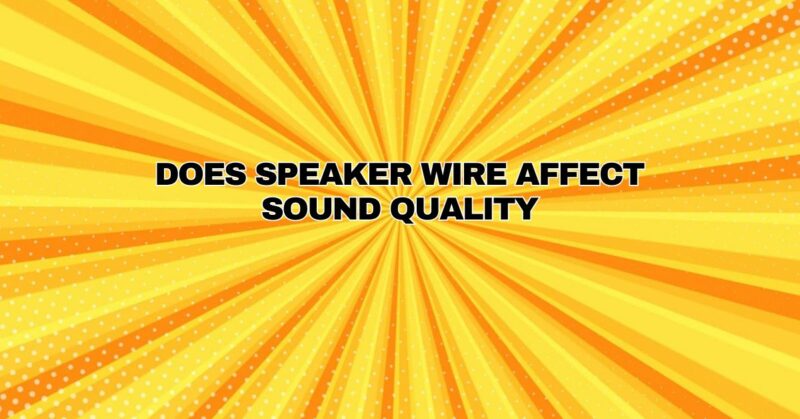The debate over whether speaker wire affects sound quality in audio systems has long been a subject of discussion among audiophiles, audio enthusiasts, and sound engineers. Some argue that the choice of speaker wire can significantly impact audio performance, while others contend that it has little to no discernible effect on sound quality. In this article, we’ll delve into the factors that influence speaker wire’s potential impact on sound quality and explore the scientific and practical aspects of this debate.
The Role of Speaker Wire in an Audio System
To understand the potential influence of speaker wire on sound quality, it’s essential to grasp the role speaker wire plays in an audio system:
- Conductivity: Speaker wire’s primary function is to conduct electrical signals from the amplifier or receiver to the speakers. In essence, it acts as a conduit for the audio signal.
- Resistance: Speaker wire has inherent electrical resistance, which is measured in ohms (Ω). Resistance can affect the flow of electrical current and, in turn, influence the power delivered to the speakers.
- Inductance and Capacitance: Speaker wire can exhibit inductance (the ability to store energy in a magnetic field) and capacitance (the ability to store energy in an electric field). These properties can interact with the audio signal.
Factors That Determine Speaker Wire Quality:
Several factors determine the quality of speaker wire:
- Conductor Material: Copper is the most common conductor material for speaker wire due to its excellent electrical conductivity. High-quality speaker cables often use oxygen-free copper (OFC) or other specialized materials for even better performance.
- Gauge: The thickness of the wire, measured in American Wire Gauge (AWG), affects its ability to conduct electricity efficiently. Thicker wire generally has lower resistance and can carry more current, which is crucial for high-power applications.
- Insulation: The insulation material covering the wire can impact durability and flexibility. High-quality insulation reduces interference and ensures long-term reliability.
- Connectors: The connectors at the ends of the speaker wire should be of high quality to provide a secure and reliable connection to your amplifier and speakers.
Debunking Common Myths:
- Exorbitant Costs: Some claim that extremely expensive, high-end speaker cables are necessary for pristine audio quality. However, scientific studies and blind listening tests often fail to demonstrate significant differences between expensive cables and reasonably priced alternatives.
- Audibility of Differences: Many factors, such as room acoustics, speaker placement, and the quality of the audio source, have a more substantial impact on audio quality than speaker wire. In controlled listening tests, individuals often struggle to discern differences in sound quality between various speaker cables.
When Speaker Wire Might Matter:
While speaker wire quality may not make a noticeable difference in all audio setups, there are scenarios where it can be more important:
- High-End Audio Systems: In exceptionally high-end audio systems with top-tier components and highly discerning listeners, premium speaker cables might offer a marginal improvement in audio quality.
- Long Cable Runs: For longer cable runs, thicker gauge wire with lower resistance can help maintain signal integrity, especially in high-power applications.
- Professional Audio and Live Sound: In professional audio setups for concerts and live events, where reliability and durability are crucial, investing in quality speaker cables is often advisable.
Conclusion:
In most home audio setups and typical listening environments, the quality of the speaker wire plays a minor role in determining audio quality. As long as you use appropriately sized, good-quality copper speaker wire, you are unlikely to notice significant differences between expensive cables and more affordable options.
However, in specialized situations where long cable runs, high power, or extreme audiophile precision come into play, selecting higher-quality speaker wire may be a worthwhile investment. Ultimately, it’s essential to consider your specific audio needs, budget, and preferences when deciding on the appropriate speaker wire for your setup. While speaker wire can play a role in audio transmission, it’s only one piece of the complex puzzle that makes up your overall listening experience.


